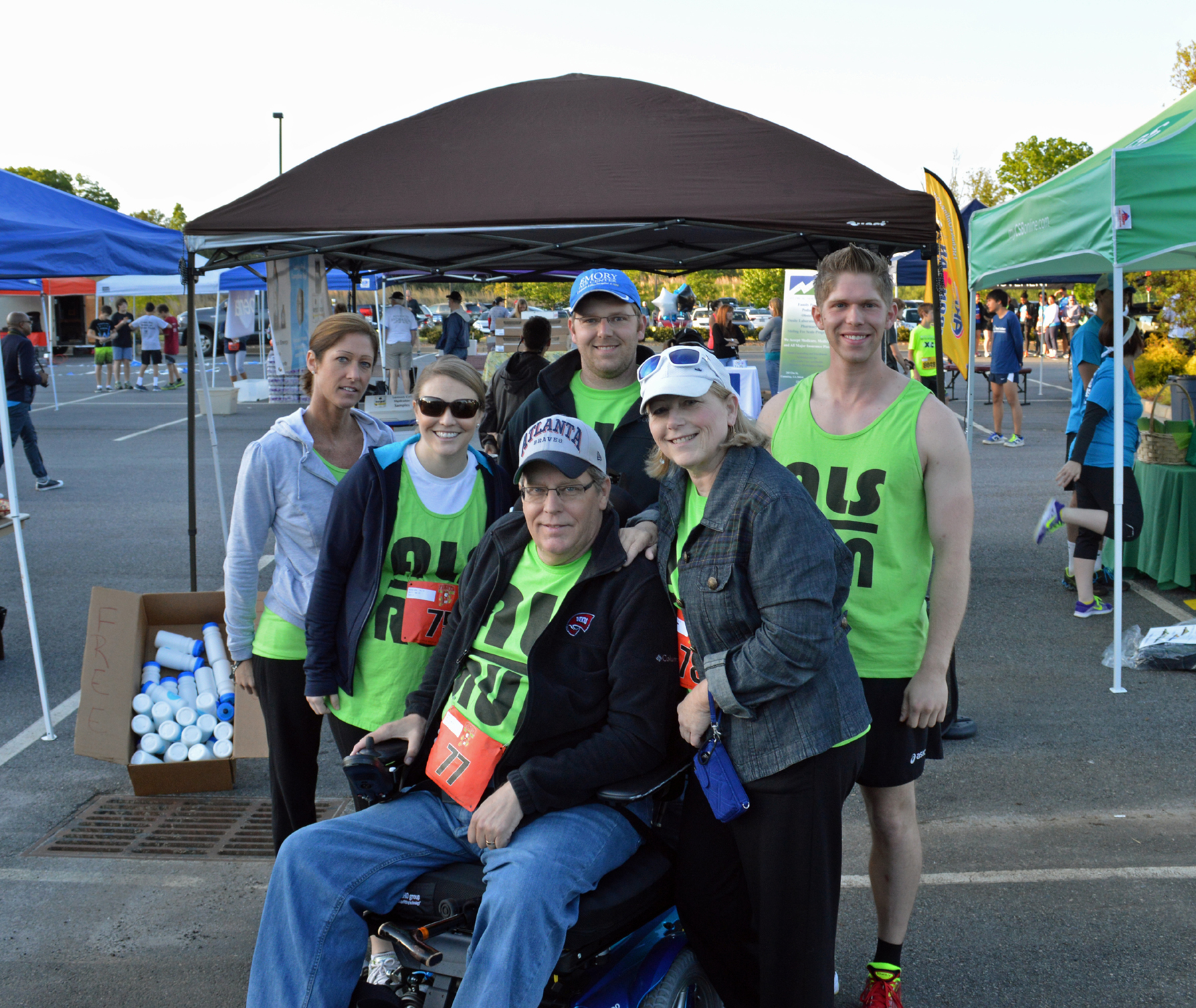
EDITOR’S NOTE: See accompanying First-Person article below.
ATLANTA (BP) — Jim Burton had no idea some odd footsteps were the first sign of ALS (Lou Gehrig’s disease).
“Normally when you walk, you have a heel to toe cadence. It’s no big deal,” said Burton, who has spent his career in Baptist work.
“But I was walking like a horse. My right foot was hitting the ground like a hoof. We laughed about it and didn’t really take it seriously, but we noticed it.”
During a routine physical, Burton mentioned it to his doctor, who didn’t seem particularly alarmed yet referred him to a neurologist. After a series of tests, Burton was told he had a preliminary form of ALS and had five to 10 years to live.
Holding out hope that it was all a mistake, Burton next visited an ALS specialist at Emory University in Atlanta. After an examination, the doctor sat down in a chair in the middle of the room in January 2013 and said, “It’s ALS. I don’t know how else to tell you. It’s straight-up ALS,” Burton recounted.
It was not a preliminary form. The disease had already progressed, with Burton already three years into ALS on the day he learned he had it.
“A typical ALS diagnosis is three to five years [to live],” Burton said. “It is terminal. There is no known cure…. We learned that this is real and it’s our new reality.”
The crisis has prompted Burton — a photojournalist who once worked for the Dallas Morning News, a former disaster relief mobilizer with the North American Mission Board and, until a few months ago, a bivocational pastor — to address life’s hard questions in a book — “Life in the Blue Zone: God, I Didn’t See This Coming” — that also tells his story.
No one expects to receive a critical health diagnosis, Burton told Baptist Press, yet, “When something bad happens, you look for the greater good. To me, as a communicator, as a minister, as a pastor, you want to help people. One of the best ways for me to do that is to use my communication skills to tell the story and maybe it will minister to other people.”
Long before ALS, however, there was cancer.
In 2002, Burton’s wife Kim was diagnosed with breast cancer. They were in their mid-40s, with kids still living at home.
“It shook us, as you can well imagine,” Burton said. “It hit me particularly hard because you immediately think death when you hear cancer.”
The doctor told Kim her prognosis “didn’t look good.” They waited days for biopsy results, their minds racing all the while.
“I think it’s human nature to anticipate the worst, partly because of what we’ve heard and partly because of what we think we know about a disease like cancer,” Burton said.
It turned out that Kim’s situation was life-altering but not particularly life-threatening and they just had to get through it. But the cancer stirred Burton to undertake a self-study on prayer related to biblical healing.
Thus much of Life in the Blue Zone was written 10 years ago while Kim was sick. The blue zone refers to the color of a handicapped sign, signifying the challenges that come with Burton’s debilitating disease.
“The first part is a narrative about her experience with cancer and more recently my ALS diagnosis. The next part is really a theological treatment of why bad things happen to good people — those big questions that virtually every human is going to ask when they get really bad news or something bad happens in their life,” Burton said.
“Her cancer caused me to think through a lot of that, and I’ve had about 10 or 12 years to let that percolate. That section was designed to help other people who get bad news like this to reconcile it and to get them to a healthy place,” he said.
The manuscript remained on Burton’s computer for a decade before God used the ALS diagnosis to prod him toward finishing it.
ALS either strikes a person’s upper or lower motor neurons first. For Burton, his lower extremities were affected first, so he now drives the most expensive vehicle of his life: a motorized wheelchair.
He’s grateful that his progression is slow compared to a lot of people, but, he noted, “The outcome is very predictable, and it’s tough…. We know where this is headed.”
Burton and his wife have celebrated their 35th wedding anniversary and welcomed their first grandchild in July. “That has been so satisfying,” he said.
“One of the things that we learned in our cancer journey is not to miss the celebration. You don’t want to miss the blessing. When you’re in a critical illness … it heightens your sensitivity to others as well as to the work of God in you and around you,” Burton said. “You understand it better, particularly as it relates to others and to acts of kindness.
“I appreciate people who care a whole lot more than I might have otherwise,” Burton continued. “I appreciate the acts of kindness more than I would have. This disease really doesn’t have a medicine…. I tell people my medicine is the acts of kindness that I receive. It means the world.
“It could be as simple as a phone call. It could be as simple as, ‘How are you doing?’ It could be as simple as, ‘Let’s go do lunch.'”
A couple of years ago Burton received a lifetime membership award from the Baptist Communicators Association.
Jim Veneman, a past president of BCA, told Baptist Press “that’s a pretty tightly held honor that doesn’t just go to random members. It goes to very specific, very deserving members whose career has had a huge impact on a lot of people. Jim certainly exemplified that. He’s just an incredibly gifted communicator.”
Veneman relayed a story from the early 1980s, soon after he and Burton met on the campus of Southwestern Baptist Theological Seminary in Fort Worth, Texas. They were walking out of class, and Veneman was flipping through an edition of the Dallas Morning News. When he got to the sports section, a huge image from the Olympic boxing trials -– being held in Dallas –- grabbed his attention.
“I said, ‘Wow! Jim, check out this photograph! This is incredible!’ I have this this habit of looking down to see the credit line beneath a photograph that I really like, and I just read it out loud. I said, ‘Check this out. It’s a photographer named Jim Burton, Dallas Morning News.’
“So the Jim Burton that I was walking with said, ‘Yeah, that’s me.’ I said, ‘Yeah, right. But I really like this photograph. I’d love to tell him.’ He said, ‘You just told him.'”
Veneman couldn’t believe his casual acquaintance, a seminary student, also was a staff photographer for a major newspaper. A lifelong friendship began.
Despite ALS, Veneman said Burton “just hasn’t stopped. … He’s just doing things a little bit differently. He continues to bring attention to the story that we all try to tell. He has not stopped telling the greatest story.”
















